| |
|
|
IZA - Electronic Archive
|

|
|
|
|
News Archive |
2014
2013
2012
2011
2010
2009
2008
2007
2006
2005
2004
2003
2002
|
2008 |
| December 2008: |
| |
| |
On November 30 and December 1, 2008, IZA celebrated its 10th anniversary with a series of high-class events at the Petersberg Hill near Bonn. The celebrations started with a scientific conference on "Frontiers in Labor Economics," followed by an expert panel discussion on "The Economist's Role in Policy Advice." A large number of invited guests from academia, politics and society attended the anniversary gala including the award ceremony for this year's IZA Prize in Labor Economics.
For more information, see also the IZA anniversary web pages.
|
| |
| |
At the occasion of its 10th anniversary, IZA underscores its commitment to labor market policy by issuing a comprehensive program for labor market reform. Entitled "Full Employment Is Not a Utopia," the document contains a number of concrete recommendations for Gemany's future labor policy. It is also meant to provide guidance on this issue with the federal elections approaching.
The key proposals include: an implementation of workfare to provide enhanced employment incentives, a systematic restructuring of social security, overdue reforms in education policy, and an economically efficient immigration policy. Against the background of the current financial crisis, IZA calls on policymakers to pursue a consistent reform strategy in labor market policy. "The IZA Labor Market Program is a must-read for the campaign strategists of all political parties," said IZA Director Klaus F. Zimmermann.
Download: IZA Labor Market Program (currently available in German only)
|
| |
| |
At the occasion of IZA's anniversary celebrations, leading German economists have followed an initiative by IZA Director Klaus F. Zimmermann urging policymakers to maintain the reform course in labor market policy. In light of the financial crisis, the experts warn not to jeopardize the clearly positive effects of the recent reform efforts.
"The reforms of the past years are a major reason why the financial crisis will not hit Germany as devastatingly as it could have otherwise. This is why it would be fatal for the government to change its course now," said Zimmermann.
The other signatories of the "Petersberg Declaration" include: Hilmar Schneider (IZA Director of Labor Policy), Michael C. Burda (Humboldt University of Berlin), Kai A. Konrad (WZB and FU Berlin), Friedrich Schneider (University of Linz), Jürgen von Hagen (University of Bonn) and Gert G. Wagner (DIW Berlin, TU Berlin, University of Erfurt).
Download: Petersberg Declaration (currently available in German only)
|
| |
| |

|
| A. Falk |
The German Research Foundation (DFG) has selected IZA Program Director Armin Falk as a winner of the Leibniz Prize for his outstanding and innovative work in behavioral economics. The prize, which is worth 2.5 million euros, underscores the high relevance of this subdiscipline of economics, to which IZA devotes an entire research program area coordinated by Falk. "The decision of the DFG is a great and well-deserved honor for Armin Falk. The results of his research have highly enriched today's discussions of labor market policies and personnel management practices," said IZA Director Klaus F. Zimmermann.
Armin Falk is Professor of Economics at the University of Bonn and Director of the Bonn Laboratory for Experimental Economics founded by Nobel laureate Reinhard Selten. After serving as IZA Director of Research between 2003 and 2007, he has continued to cooperate closely with IZA as Program Director for Behavioral and Personnel Economics.
|
| |
| |
The "Me, Inc." (start-up subsidy, Existenzgründungszuschuss) was one of the pivotal instruments that were incorporated into the toolbox of labor market policy in the course of the "Hartz" reforms of the German labor market. Along with the bridging allowance ( Überbrückungsgeld), which had been available for some time, it supported more than one million unemployed people in founding a business between 2003 and 2006. Earlier studies have shown that both programs complemented one another by motivating different groups of individuals to set up their own business. The short- and medium-term analyses as part of the "Hartz" evaluations also provided a positive assessment of both programs. However, their long-term effects have not been examined yet.
A recent IZA Discussion Paper has closed this gap and shed light on how recipients of the start-up subsidy and the bridging allowance fare five years after their business was set up. The results show that at this point almost 60% of the former "Me, Inc." founders and nearly 70% of former recipients of the bridging allowance are still self-employed. In terms of the integration into the first labor market, both programs may be deemed successful: Their participants not only exhibit higher employment rates than a control group of unemployed people who did not receive support, but they also earn significantly higher incomes. Moreover, the employment effects induced by the bridging allowance are rather large: 100,000 cases of business start-ups supported by this subsidy have led to the creation of additional employment equaling almost 80,000 full-time jobs.
Further reading (in German):
- IZA Press Statement (December 11, 2008)
- Complete study: IZA DP No. 3880Marco Caliendo, Steffen Künn, Frank Wießner, Die Nachhaltigkeit von geförderten Existenzgründungen aus Arbeitslosigkeit: Eine Bilanz nach fünf Jahren. IZA DP No. 3880, December 2008.
|
| |
| |
In view of the current economic crisis, IZA proposes the distribution of training vouchers to all workers aged 45 and over. At the same time, IZA calls on service providers in the education sector to form public-private partnerships in order to offer adequate and attractive programs for everyone. "In contrast to financially risky economic stimulus packages, the positive effects of investment in education and training will last well into the future", said IZA Director Klaus F. Zimmermann.
See the IZA press statement of December 12, 2008 (in German).
|
|
| November 2008: |
| |
| |
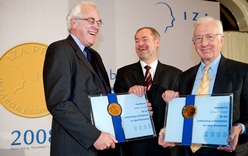
|
| S. J. Nickell | K. F. Zimmermann | R. Layard |
Richard Layard and Stephen J. Nickell received this year's IZA Prize in Labor Economics from IZA Director Klaus F. Zimmermann during a festive ceremony on December 1 at the Petersberg Hill near Bonn. The event was part of IZA's 10th anniversary celebrations. The IZA Prize 2008 honors the path-breaking work of Layard and Nickell on the relationship between labor market institutions and unemployment. Their research provided a theoretical and empirical framework for the analysis of equilibrium unemployment and the impact of labor market institutions on economic performance. According to the award statement, the contributions of Layard and Nickell have illuminated the policy discourse in Europe and increased academics' understanding of the nature and causes of involuntary joblessness. Lord Richard Layard is Emeritus Professor of Economics at the London School of Economics (LSE) and a Labour life peer in the House of Lords. Stephen Nickell is Warden of Nuffield College, University of Oxford, and was previously a Professor of Economics at LSE and a member of the Bank of England Monetary Policy Committee. Among the speakers in honor of Lord Richard Layard and Stephen Nickell was Frank-Jürgen Weise, CEO of the Federal Employment Agency. The laudation on the prize-winners was given by Richard B. Freeman (Harvard University; IZA Prize Laureate 2007).
Read more:
- IZA Press Statement
- Award Statement
|
| |
| |
Restoring the credibility of the global economic system is the key to overcoming the current financial crisis. "Throughout the election campaign President Barack Obama has shown economic competence and trustworthiness. He can contribute greatly to restoring trust in our market economy," said IZA Director Klaus F. Zimmermann in Washington, where he observed the U.S. elections.
However, the new President will face almost insurmountable challenges, Zimmermann added. The tough realities of the financial crisis and its budgetary impact will stand in the way of Obama's goal to create a fairer society. But since Obama is known to seek the advice of high-qualified academic experts, Zimmermann expects the new President to be open to unorthodox proposals and initiatives. Obama's leadership style is marked by cooperation and pragmatism, said Zimmermann. Yet this will also require Europe, particularly Germany, to assume a greater role in international security cooperation.
According to Zimmermann, the key economic issues to be dealt with by the Obama administration will be the financial crisis, the impending recession, healthcare reform, climate control, energy supply, trade relations, and immigration. The October issue of DIW-Wochenbericht features a joint article by Zimmermann and Amelie F. Constant (DIW DC and IZA) on the major challenges for the next U.S. President [read the complete text].
|
| |
| |
The Board of Trustees of the German Institute for Economic Research (DIW Berlin) has appointed IZA Director Klaus F. Zimmermann for a third term as President of DIW Berlin. Chairman of the Board of Trustees Holger Hatje underscored Zimmermann's achievements in "pushing the institute forward." The Scientific Advisory Board also acknowledged the great scientific progress of DIW Berlin since Zimmermann took office in 2000. IZA and DIW Berlin have cooperated closely for many years. Both institutes also share a privileged relationship with DIW DC in Washington.
|
| |
| |
As part of its 10th anniversary celebrations, IZA held a high-level Employment Seminar in Brussels. This initiative was taken to strengthen the links between IZA with its European partners and international institutions as well as stimulate the dialogue between research and policy making in Europe. The topic of the seminar, organized by IZA Director Klaus F. Zimmermann and IZA Deputy Director of Labor Policy Werner Eichhorst and co-funded by the German Thyssen Foundation, was the relation between labor market performance and distributional outcomes against the background of the EU's Lisbon Strategy. It brought together about 40 academic and policy-oriented participants from EU Member States, European institutions and other international organizations.
Read more: Report, program and photo gallery
|
|
| October 2008: |
| |
| |
In two new studies on incentivizing pro-social behavior, IZA Research Fellow Mario Macis and co-author Nicola Lacetera find a substantial impact of non-monetary incentives. In the first study they analyze the effects of an Italian law granting a day of paid leave to employees who donate blood. Using longitudinal data on blood donors in a midsized town, the authors estimate that the program increases the frequency of blood donations by about 30% (one extra donation per year) among employed donors. They also stress the importance of heterogeneous motivations among donor groups: A sizable fraction of donors chose not to take advantage of the material reward by donating primarily on Saturdays. This indicates that many donors are also driven by altruism and social image concerns. The latter motive is analyzed in the second study, which finds that the incentive effect of symbolic rewards, such as honorary medals for regular blood donors, is substantial if the names are publicly announced.
Further reading:
- IZA Press Statement (in German) - October 22, 2008
- Complete papers: IZA DP No. 3770 | IZA DP No. 3771
|
| |
| |
On October 2, 2008, IZA Director Klaus F. Zimmermann joined a group of leading European and US economists in signing a declaration urging European governments to adopt a Europe-wide financial market regulation.
Excerpt from the declaration: "This is a once-in-a-lifetime crisis. Trust among financial institutions is disappearing; fear may spread. Last week's US experience showed that saving one bank at a time won't work. A systemic response is needed and in Europe than means an EU-led initiative to recapitalise the banking sector. Unless Europe's leaders immediately unite to address this crisis head on before it spirals out of control, they may find themselves fighting over how best to salvage the aftermath." [read the complete text]
On October 9, the group of experts also provided concrete proposals to the G7/8 finance ministers:
Rescuing Our Jobs And Savings: What G7/8 Leaders Can Do To Solve The Global Credit Crisis
|
| |
| |
In October 2008, unemployment figures in Germany are expected to drop below 3 million for the first time since 1992. This is the finding of an IZA research report prepared for the Initiative Neue Soziale Marktwirtschaft. According to IZA calculations, West German unemployment will fall below 2 million. With East German figures under 1 million, overall unemployment in Germany could go back to a level of 2.87 million later during the month. "This is great news for the German labor market. As the reforms of the past years finally bear fruit, our policymakers are well-advised to stay on course in order to bring down unemployment even further," said IZA Director Klaus F. Zimmermann during the presentation of the study in Berlin.
Read the complete text (in German): IZA Research Report No. 20
|
| |
| |

|
| D. Hamermesh |
On October 20, 2008, IZA Research Director Daniel S. Hamermesh celebrates his 65th birthday. Among the first to congratulate him was IZA Director Klaus F. Zimmermann: "For many years, Dan has been a source of inspiration and with his loyal support he has been of great help for the further development of our institute. I am very grateful for his service to the IZA, and the profession. We all wish Dan good health, happiness and splendid research ideas, as well as a further deep and ongoing relationship with IZA."
Daniel S. Hamermesh is Sue Killam Professor in the Foundations of Economics at the University of Texas at Austin. His A.B. is from the University of Chicago (1965), his Ph.D. from Yale (1969). He taught from 1969-73 at Princeton, from 1973-93 at Michigan State, and has held visiting professorships in the United States, Europe, Australia and Asia. He is a Fellow of the Econometric Society, a research associate of the National Bureau of Economic Research, and was President of the Society of Labor Economists in 2001. He authored Labor Demand, The Economics of Work and Pay, Economics Is Everywhere, and a wide array of articles in labor economics in the leading general and specialized economics journals. His research concentrates on time use, labor demand, social insurance programs (particularly unemployment insurance), and unusual applications of labor economics (to suicide, sleep and beauty). He joined IZA as a research fellow in July 1998. From December 2001 until July 2008, he was IZA Program Director for the institute's research program "The Future of Labor" before he became IZA Director of Research in August 2008.
|
|
| September 2008: |
| |
| |
At this year's Metropolis Conference (Bonn, October 27-31, 2008), IZA will be organizing a plenary session on "Circular and Temporary Migration" to address a migration policy question of growing importance. While posing substantial challenges for integration policy, circular and temporary migration can also contribute to enhanced labor market flexibility. Moderated by IZA Director Klaus F. Zimmermann, the panel discussion will seek to highlight different approaches to these new forms of immigration. Discussants will include Demetrios Papademetriou (Migration Policy Institute, Washington), Philippe Fargues (Consortium for Applied Research on International Migration), Pawel Kaczmarczyk (Board of Strategic Advisers to the Prime Minister, Poland) and Jacques Poot (University of Waikato, New Zealand), among others.
As part of Metropolis 2008, IZA is also organizing two workshops. Chaired by Klaus F. Zimmermann and IZA Deputy Program Director Amelie Constant (Georgetown University and DIW DC), the workshop on "Ethnic Diversity in a Globalized World" analyzes the economic importance of ethnic diversity and the impact of ethnicity on labor market outcomes. Presenters will be John W. Berry (Queen's University, Kingston, Canada), Alan Manning (London School of Economics), Thierry Verdier (Paris School of Economics) and Yves Zenou (Stockholm University). The workshop on the "Ethnic Divide in Eastern Europe," chaired by IZA Deputy Program Director Martin Kahanec, will focus on the economic and social situation of ethnic minorities in Central and East European countries. Presenters include Christian Bodewig (World Bank), Gabor Kezdi (Central European University Budapest), Ott-Sim Toomet (University of Tartu), Mihails Hazans (University of Latvia) and Anzelika Zaiceva (IZA).
Metropolis, the world's largest annual conference on questions of immigration and integration, will be held in Germany for the first time this year. "As a Bonn-based institute with extensive expertise in the field of migration research and policy, it is natural for IZA to contribute actively to the scientific program of the conference," said Zimmermann. During the conference IZA will also open its doors to interested participants.
Details on the Metropolis 2008 preliminary program and registration are available at www.metropolis2008.org.
|
| |
| |

|
| K. F. Zimmermann |
IZA Director Klaus F. Zimmermann, who is also President of DIW Berlin, has been appointed as a member of the World Economic Forum's Global Agenda Council on Migration. This council, consisting of a small group of the most knowledgeable and relevant personalities in this field, is integrated into the Network of Global Agenda Councils of the World Economic Forum addressing all the crucial challenges of humankind to ensure that interlinkages among global issues are fully explored. The Network of Global Agenda Councils has a major impact on shaping the global agenda by monitoring and prioritizing global challenges, by elaborating solutions and by being available in crisis management situations. It will also act as an advisory board to the World Economic Forum and other interested parties, such as governments and international organizations.
|
| |
| |
On September 11, 2008, a group of IZA employees joined a charity run organized for companies located in the Bonn area. Despite rainy weather, almost twenty IZA staff members and researchers from five nationalities completed the 3.6-mile run around the beautiful Rheinaue park south of Bonn. The proceeds of the event, in which more than 3,500 runners and walkers participated, went to Care International and a German cystic fibrosis foundation. "Boosting team spirit, improving employee health and supporting a good cause all at the same time – what a perfect way to enhance productivity among our staff," said IZA team captain Mark Fallak after the successful run, in which finishing was more important than time.
|
| |
| |
Over the last decade, many industrialized countries shifted from passive unemployment and welfare benefit regimes and traditional active labor market and social policies to activation strategies by making benefit receipt conditional upon accepting job offers or participation in active labor market schemes. But countries differ with regard to the design of activation instruments and their implementation, the definition of target groups and the effects of activation in the national labor market setting. A newly published volume, edited by Werner Eichhorst, IZA Deputy Director of Labor Policy, Otto Kaufmann, Senior Research Fellow at the Max Planck Institute for Foreign and International Social Law in Munich, and Regina Konle-Seidl, Senior Researcher at the Nuremberg-based Institute for Employment Research (IAB), provides an up-to-date overview of activation strategies in unemployment benefit systems and social assistance. It covers seven European countries, namely Germany, France, the Netherlands, Switzerland, Denmark, Sweden and the UK, as well as the US. A particular focus lies on the development of activation schemes, governance and implementation and on the outcomes of activation in terms of labor market and social integration. The volume is the first to address these issues both from a socio-economic and a legal perspective.
|
| |
| |

|
| K. F. Zimmermann |
Commenting on the EU interior ministers' meeting on migration issues on September 25, 2008, IZA Director Klaus F. Zimmermann welcomed the Bluecard initiative to attract high-qualified workers from non-EU countries as "an important step toward a common European immigration policy." In view of the skilled labor shortages caused by demographic change in many EU-15 countries, Zimmermann also called on policymakers to implement complete freedom of movement for workers from the accession states. "If we fail to meet this strong demand for qualified workers, we waste a great chance to stimulate employment and economic growth. Germany in particular should abandon its restrictions on immigration from Eastern Europe. Unless we start actively attracting the 'best and brightest' from this region, we will forever lose them to other countries. Implementing any of these steps to reduce immigration obstacles will require more political courage than we have seen so far," said Zimmermann.
|
| |
| |

|
| A. Falk |
On September 24, 2008, IZA Program Director Armin Falk (University of Bonn) was awarded the Gossen Prize by the Verein für Socialpolitik during the association's annual meeting in Graz, Austria. Carrying a cash prize of 10,000 euros, the Gossen Prize is considered the most prestigious science award for economists from German-speaking countries. It honors the work of economists under 45 years of age who have achieved a wide international reputation. Falk has published a number of articles in leading international journals on his research in behavioral and experimental economics. He became a Research Fellow in 2002 and served as IZA Research Director from 2003 until 2007. Since then he has been IZA Program Diretor for Behavioral and Personnel Economics. "IZA congratulates Armin Falk on this great honor, which he truly deserves as an outstanding pioneer in his field," said IZA Director Klaus F. Zimmermann.
|
|
| August 2008: |
| |
| |
|
|
| |
| |
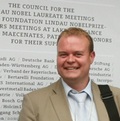
|
| U. Rinne |
IZA scholarship holder Ulf Rinne has been nominated to attend the 3rd Lindau Meeting in Economic Sciences (August 20-23, 2008) as a Handelsblatt Fellow. As one of 297 participants selected from the best young economists worldwide, he will meet 14 Laureates in Economic Sciences and the Winner of the Nobel Peace Price, Professor Yunus, in the Lake Constance region. The Lindau Nobel Laureate Meetings provide a globally recognized forum for the exchange of knowledge between Nobel Laureates and young researchers. The unique conference format contributes to the generation of new ideas, encourages personal contacts, inspires scientific endeavor over and beyond the norm, and enables the critical examination of scientific questions from fresh points of view. "The invitation to this exclusive event is a great honor for Ulf Rinne and the IZA scholarship program," said IZA Director Klaus F. Zimmermann. With Steffen Altmann and Matthias Wibral nominated in 2006, Rinne will be the third IZA representative to participate in Lindau. Among the other participants is Philipp Tillmann (University of Cologne), who is currently an intern at IZA.
For more information about participants and program details see the website www.lindau-nobel.de.
|
| |
| |
In August 2008 the state government of North-Rhine Westphalia published its first report on the integration of immigrants. IZA Director Klaus F. Zimmermann referred to the report as "an excellent documentation of the strengths and weaknesses of integration policy in this state." According to Zimmermann, the report is "a clear signal that we need an immigration policy based on economic aspects in order to reduce unemployment among immigrants and overcome the shortage of skilled labor." He welcomed the NRW report as providing a detailed account of the labor market outcomes among various migrant groups, with a differentiation between naturalized and non-naturalized immigrants.
[Download NRW Integration Report] (in German)
|
| |
| |
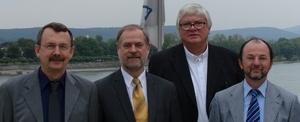
|
| W. Streeck, K. F. Zimmermann, B. Hombach, P. Schnabel |
Chaired by IZA Director Klaus F. Zimmermann, the working group on "Employment, Participation and New Security" of the Commission on the Future of North-Rhine Westphalia met for the second time at IZA (August 28, 2008). In addition to the working group members Bodo Hombach (WAZ Media Group), Paul Schnabel (Social and Cultural Planning Office, The Hague) and Wolfgang Streeck (Max Planck Institute for the Study of Societies, Cologne), the meeting was attended by Lord Ralf Dahrendorf, who heads the Future Commission. The issues discussed in the working group will be reflected in the Commission's report to be submitted to state premier Jürgen Rüttgers.
|
|
| July 2008: |
| |
| |
A new IZA report for the European Commission investigates the discrepancy between skill shortages in some areas of the EU and persistently high unemployment in others. Conducted in cooperation with NIRAS Consultants and the Swedish National Labour Market Board (AMS), the study finds that mobility rates both within and between EU member states are still rather low. Increased labor mobility could lead to a more balanced allocation of jobs and help reduce the real wage gap between member states. Both the sending and receiving countries would benefit from positive growth effects associated with free movement of human capital reducing labor market imbalances, improved skill matches in an integrated market, higher investment in education, and a higher level of innovation and entrepreneurship.
As the main impediments to higher intra-EU mobility, the report identifies language and cultural barriers as well as the persistence of national forms of labor market and housing market organization, welfare state and fiscal systems. "The member states should develop mobility-enhancing initiatives and better coordinate their labor market policies, particularly with regard to pension portability and the transparency of educational qualifications," said IZA Director Klaus F. Zimmermann, who co-authored the study.
The full text of the report is downloadable in PDF format:
- IZA Research Report No. 19: Geographic Mobility in the European Union: Optimising its Economic and Social Benefits
|
| |
| |
The main theme of the July issue is the broad range of IZA research activities on issues of migration and integration. As part of a large-scale interdisciplinary project funded by the Volkswagen Foundation, IZA has produced numerous publications on the role of ethnicity in the labor market. In addition, IZA has organized a number of conferences and expert meetings dealing with key questions of migration and integration policy.
For further topics of the current issue see the table of contents.
The IZA Compact print newsletter is distributed to nearly 10,000 subscribers worldwide. It is also available online: [Download PDF]
|
| |
| |
A new study by IZA Research Fellows Christian Dustmann and Uta Schönberg (University College London) analyzes the long-term impact of several expansions in leave coverage in Germany. It is the first study to investigate the effects of extended maternity leave on children's educational and labor market success. Analyzing several German reforms over the past 30 years, the authors found no significant positive impact of leave coverage expansions on the educational and economic outcomes of the children affected by the reforms. For instance, a 1992 reform that doubled leave coverage from 18 to 36 months raised the share of students who would later attend the highest schooling track by no more than 0.1%. Likewise, a 1979 reform expanding leave coverage from two to six months did not result in any measurable earnings advantages for the children later on. "Our study casts doubt that further expansions in leave coverage will be successful in improving children's long-term career outcomes," says Dustmann. For more information, see the press statement or download the complete paper [IZA DP No. 3605].
At the same time, extended periods of maternity leave have a negative impact on mothers' future labor market prospects and require stronger incentives to participate in adult education, as another recent study by IZA Program Director Gerard van den Berg and IZA Fellow Annette Bergemann (VU University Amsterdam) found [IZA DP No. 3600].
|
| |
| |
A recent IZA Discussion Paper analyzes the regional factors that influence the decision to attend a university. While the effects of many different socio-economic background variables and financial incentives on educational attainment have been widely researched, this is the first microdata-based study for Germany that focuses on regional factors. The results show that each additional 10 kilometers of distance to the nearest university explains a 2-3 percentage point reduction in the probability of attending a university. According to the authors, this can be attributed mainly to the costs of housing or commuting. "In order to reach its goal of raising the share of university students to 40%, the German government should take these regional factors into account and implement measures to reduce the transaction costs for students who live far away from the next university," said IZA Research Affiliate Katharina Wrohlich, who co-authored the study available as IZA DP No. 3615 C. Katharina Spiess, Katharina Wrohlich, Does Distance Determine Who Attends a University in Germany?. IZA DP No. 3615, July 2008.
|
|
| June 2008: |
| |
| |
While it has been proven empirically that risk-loving individuals are more likely to become an entrepreneur, little is known about the success of their endeavors. A recent study co-authored by IZA Senior Research Associate Marco Caliendo analyzes the relationship between risk attitudes of entrepreneurs and the probability of firm survival or failure. According to the study, those who are either particularly risk-averse or risk-loving have a substantially higher chance (12.5%) of failing as entrepreneurs than those with a medium-range risk propensity (failure rate: 7.5%). Risk-loving entrepreneurs tend to fail mainly due to the risk structure of their business projects: While higher risks lead to greater profit expectations, they also increase the probability of failure. On the other hand, risk-averse entrepreneurs are faced with a higher failure rate because low-risk investments bear smaller expected returns. In these cases, earnings from self-employment may be lower than previous wage earnings, thus causing the entrepreneurs to reverse their decision to start a business.
Further reading:
- IZA Press Statement (in German) - June 3, 2008
- Complete study: IZA DP No. 3525Marco Caliendo, Frank Fossen, Alexander Kritikos, The Impact of Risk Attitudes on Entrepreneurial Survival. IZA DP No. 3525, June 2008.
|
| |
| |
A recent IZA Discussion Paper analyzes the effect of employment protection legislation on productivity growth. The results suggest that dismissal regulations have a depressing impact on productivity growth in industries where layoff restrictions are binding. Replacing strict dismissal protection with a policy of mandatory severance payments may therefore help improve the sustainability of social security systems by stimulating productivity growth, which already accounts for half of overall economic growth in OECD countries.
Further reading:
- IZA Press Statement (in German) - June 24, 2008
- Complete study: IZA DP No. 3555Andrea Bassanini, Luca Nunziata, Danielle Venn, Job Protection Legislation and Productivity Growth in OECD Countries. IZA DP No. 3555, June 2008.
|
|
| May 2008: |
| |
| |
On behalf of the Federal Ministry of Economics and Technology (BMWi), IZA has published a study on the implementation of the workfare approach as part of the BMWi model to create employment that pays a living wage. On May 13, 2008, IZA Director Klaus F. Zimmermann and BMWi Undersecretary Walter Otremba presented the study to the public in Berlin. The BMWi model aims at requiring welfare recipients to work in return for the transfer payments they receive. The idea is to create more incentives to secure a living through full-time work without state assistance. Last year IZA had already estimated that up to 1.4 million new jobs may be created in the process, thus lowering public expenditures by about 25 billion euros per year. According to the new study, the BMWi model could be implemented without extraordinary organizational efforts. Meanwhile, the scientific adivsory committee of the Federal Ministry of Finance (BMF) has also proposed the introduction of workfare elements.
Read also (in German):
- BMWi press statement (May 13, 2008)
- IZA Research Report No. 18
- IZA Research Report No. 12
- Report of the BMF advisory committee
|
| |
| |
A recent IZA Discussion Paper analyzes the efficiency and effectiveness of social spending in reducing poverty in the EU. According to the study, the Czech Republic distributes its social expenditures most efficiently, whereas Spain, Italy and Greece are found to be most inefficient at reducing poverty. Although Germany's social system has one of the highest shares of GDP, it ranks only 12th in terms of effectiveness [download complete study]. Peter Herrmann, Arno Tausch, Almas Heshmati, Chemen S. J. Bajalan: Efficiency and Effectiveness of Social Spending, IZA Discussion Paper No. 3482, May 2008.
|
| |
| |

|
| O. Blanchard |
Dominique Strauss-Kahn, Managing Director of the International Monetary Fund, named Olivier Blanchard new chief economist of the IMF, effective September 1, 2008. MIT professor Blanchard has been affiliated with IZA as a Research Fellow since March 2001.
IZA Director Klaus F. Zimmermann welcomed the decision as a "premium choice for this crucial, policy-oriented position." According to Zimmermann, Blanchard's "impressive publication record covers the whole range of fields relevant to the work of the IMF. With his experience and scientific excellence, Olivier Blanchard is well-equipped to close the gap between policy practice and the implications of state-of-the-art research in economics."
|
|
| April 2008: |
| |
| |
A recent IZA Discussion Paper finds that the ERASMUS program of the European Union has been very effective in terms of increasing labor market mobility within Europe. The results indicate that participation in ERASMUS has increased the probability of working abroad later by up to 20 percentage points. The policy also seems to foster the goal of an integrate EU labor market: Of those who opt for a career abroad, two-third end up working in a European country.
M. Parey/F. Waldinger, Studying Abroad and the Effect on International Labor Market Mobility: Evidence from the Introduction of ERASMUS. IZA Discussion Paper No. 3430.
|
| |
| |
In May 2008, the "Commission on the Future of NRW" will take up its task to advise the state government of North-Rhine Westphalia on education, economic and labor market policy with a particular focus on questions of solidarity in an aging society. Established by the state's prime minister Jürgen Rüttgers, the independent commission will prepare a report on "NRW 2025 – Innovation, Employment, Quality of Life" with recommendations to achieve these goals. The state government intends to incorporate this advice in next year's agenda and discuss the issues at an annual Europe-wide congress on the living conditions of future generations. Among the 23 members of the commission representing various areas of society, IZA Director Klaus F. Zimmermann will coordinate the activities in the areas of economy and labor.
For further information see the NRW press release (in German).
|
| |
| |
Klaus F. Zimmermann, CEO and Director of IZA and President of the German Institute for Economic Research (DIW Berlin), was re-elected for another three years as Director of the Executive Board of the Association of German Economic Research Institutes (ARGE) on April 17, 2008. Among the other board members are IZA Policy Fellows Thomas Straubhaar (HWWI) and Johann Eekhoff (University of Cologne), as well as Ulrich Blum (IWH), Wolfgang Franz (ZEW), and Hans-Werner Sinn (ifo). Established in 1949, ARGE is the umbrella organization of 30 German economic research institutes. "Given the multitude of economic challenges ahead, it is important that the institutes keep pushing for sustainable economic policies. ARGE provides an excellent platform for this purpose," said Zimmermannn after his re-election.
|
|
| March 2008: |
| |
| |
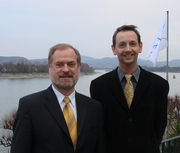
|
| K. F. Zimmermannn, M. Frölich |
IZA Research Fellow Markus Frölich (University of Mannheim) has joined Robert Holzmann (World Bank) as Program Director for the IZA Program Area " Employment and Development" in March 2008. He is taking over from IZA Director Klaus F. Zimmermann, who had acted as interim program director after launching the cooperation with the World Bank in 2006.
Markus Frölich has been Full Professor of Econometrics at the University of Mannheim since January 2008. He received his Ph.D. from the University of St. Gallen in October 2002 for his thesis on "Programme Evaluation and Treatment Choice." After visiting University College London as a Marie Curie Individual Fellow, he became Assistant Professor at the University of St. Gallen. In addition to development economics and evaluation, his research interests include the economics of education. Zimmermann welcomed Frölich's decision to coordinate IZA's activities in the field of employment and development: "Markus Frölich is a young, dynamic researcher who has cooperated with IZA for quite some time. He will certainly contribute a great deal to advancing this important research area together with Robert Holzmann."
|
| |
| |
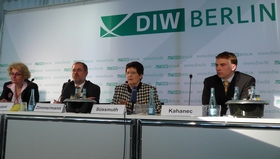
|
| A. Constant, K. F. Zimmermann, R. Süssmuth, M. Kahanec |
On March 12, IZA CEO and Director Klaus F. Zimmermann and IZA Senior Research Associates Martin Kahanec and Amelie Constant (also DIW DC and Georgetown University) presented a recent IZA study on the shortcomings in the social and economic integration of ethnic minorities in the EU. Based on this extended EU-wide survey, a "High Level Group", commissioned by the European Commission, has published a comprehensive report containing policy recommendations for European and national integration policies. During this Berlin Lunchtime Meeting, Rita Süssmuth (President, High Level Group) presented the group's report and discussed the topic of better social and labor market integration of ethnic minorities with the IZA experts.
Further reading:
- IZA Press Statement (in German)
- IZA Study on the Social and Labour Market Integration of Ethnic Minorities
- Report of the High Level Group: "An Urgent Call for Better Inclusion"
|
| |
| |
In a joint declaration published in today's issue of the German business daily Handelsblatt, the leaders of Germany's top economic research institutes - including IZA CEO and Director Klaus F. Zimmermann - strongly advised policymakers against the introduction of a legal minimum wage across industries. The implementation of recent plans by the Federal Ministry of Labor would erode the collective bargaining process and undermine the foundation of Germany's successful market economy principle, warned the economists. Apart from its negative employment effects, the planned minimum wage would be unsuitable as a redistributive instrument and therefore inefficient from a social policy perspective.
The complete text of the declaration is available in Germany language only.
|
|
| February 2008: |
| |
| |

|
| R. Riphahn |
As of February 1, 2008, Regina T. Riphahn has been appointed a member of the German Science and Humanities Council ( Wissenschaftsrat), an influential advisory body to the federal and state governments. Its function is to draw up recommendations for the development of higher education institutions, science and the research sector. After completing her post-doctoral habilitation under IZA Director Klaus F. Zimmermann in 1999, Riphahn taught at the University of Mainz (2000-2001) as an Associate Professor of Economic Policy and headed the statistics and econometrics group at the economics department of the University of Basel (2001-2005). Since April 2005 she holds the chair for Statistics and Empirical Economics at the University of Erlangen-Nuremberg. She has been an IZA Research Fellow since 1999 and Research Professor at DIW Berlin since 2001.
Zimmermann welcomed her appointment to the Science Council: "As one of the most promising and competent young economics professors in Germany, Regina Riphahn is certainly the ideal candidate for this position."
|
| |
| |
An international comparative study by IZA and the Berlin-based economic research institute E-x-AKT on behalf of the German Federal Ministry of Family Affairs, Senior Citizens, Women and Youth analyzes the supply and demand for family-related services beyond childcare. The authors present comparative data from several European countries on employment in this sector and case studies of Sweden, Denmark, Belgium and France. With regard to the development of a market for family-related services, Germany clearly lags behind. Potential ways to remedy the situation include cost reductions and a simple-to-use voucher model, in which private firms and service agencies could be integrated. Family-related services may also be a suitable component of activating strategies for transfer recipients. Werner Eichhorst/Verena Tobsch: IZA Report No. 17: Familienunterstützende Dienstleistungen: Internationale Benchmarking-Studie, Bonn 2008 (47 pages) - available in German only.
|
| |
| |

|
| A. Falk |
IZA Program Director Armin Falk (University of Bonn) has been awarded a 1.3 million euro "Starting Independent Researchers Grant" by the European Research Council (ERC). The ERC Starting Grants aim to support up-and-coming research leaders who are about to establish or consolidate an independent research team and to start conducting independent research in Europe. The scheme targets promising researchers who have the proven potential of becoming independent research leaders. Armin Falk was among the few German researchers whose proposal was selected from more than 9,000 applications. He will receive the ERC funding for the next five years to pursue and further enhance his research activities in behavioral and personnel economics. The ERC's decision once again proves the outstanding position of Bonn as a location for cutting-edge research in economics.
|
|
| January 2008: |
| |
| |
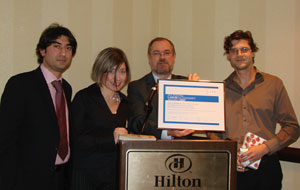
|
| I. Rasul, O. Bandiera, K.F.Zimmermann, I. Barankay |
On January 5, 2008, IZA Director Klaus F. Zimmermann presented the second IZA Young Labor Economist Award to Oriana Bandiera (London School of Economics), Iwan Barankay (University of Warwick) and Imran Rasul (University College London) during an IZA reception held at the Annual Meetings of the Allied Social Science Associations (ASSA) in New Orleans. The award honors an outstanding paper published by young labor economists under the age of 40. The selection committee – consisting of Zimmermann and the six IZA Program Directors – chose their joint paper "Social Preferences and the Response to Incentives: Evidence from Personnel Data" ( Quarterly Journal of Economics, 2005) from a large number of nominations submitted by IZA Research Fellows.
During the award ceremony, Zimmermann said the selection committee was impressed with the "originality of the research approach, the methodological rigor and the thorough analysis of the data" in the prize-winning paper, which has important implications for the design of incentive schemes: Analyzing personnel data from a UK farm, the authors found that due to the workers' social preferences their daily productivity was at least 50% higher under piece rates compared to relative performance incentives.
In his acceptance speech, Barankay thanked the community of labor economists for nominating the paper, as well as the "142 fruit pickers without whom our research would not have been possible."
|
| |
| |
As of January 2008, IZA Director Klaus F. Zimmermann has been Senior Editor of Applied Economics Quarterly, an international journal publishing empirical research with relevance for economic policy. The journal's goal is to contribute to current policy debates and enhance economic policy-making by providing a forum for innovative and rigorous empirical research. While the journal is global in scope, it has a strong focus on European policy issues.
|
|
| |
|
|
|
|